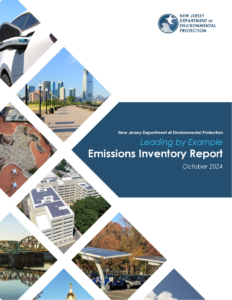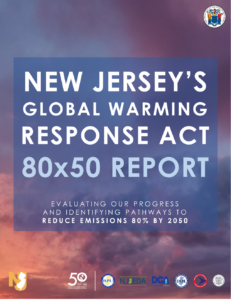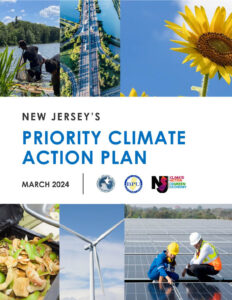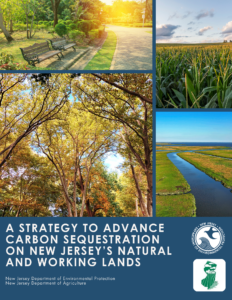
CURBING OUR EMISSIONS
Curbing Our Emissions in New Jersey
New Jersey is actively tracking its greenhouse gas emissions and working towards achieving its greenhouse gas emission reduction goals. Climate change programs in New Jersey are effectively reducing greenhouse gas emissions that cause climate change. These programs include regulations, market programs and incentives that will transform all sectors of the economy.
Climate Mitigation Plans
Leading By Example: Emissions Inventory Report
The New Jersey Department of Environmental Protection recognizes the critical leadership role it plays in combating climate change and advancing clean energy. Achieving the State’s ambitious greenhouse gas reduction goals requires a whole-of-government approach, including decarbonizing the operations of state government itself. The Leading by Example: Emissions Inventory Report develops a baseline inventory of the Department’s buildings and vehicle stock, while also identifying opportunities to implement energy efficiency and climate mitigation projects.
Global Warming Reponses Act 80×50 Report
In 2020, the state released the Global Warming Response Act (GWRA) 80×50 Report . This report was written in response to the mandate in the Global Warming Response Act, to reduce New Jersey’s greenhouse gas emissions by 80% from their 2006 levels by 2050. This report builds on the 2019 Energy Master Plan , serving as the State’s comprehensive plan to reduce greenhouse gas emissions from both energy and non-energy systems, providing guidance, policies, regulatory and legislative recommendations to meet the State’s emissions reduction goals.
For more information on the report, visit our GWRA 80×50 page.
Climate Pollution Reduction Grant Program
The Climate Pollution Reduction Grant (CPRG) program is a nationwide, two-phase grant, funded via the Inflation Reduction Act. Phase one provides $250 million in noncompetitive planning grants to states, local governments, tribes, and territories to develop and implement climate action plans for reducing greenhouse gas emissions and other harmful air pollution. Phase two provides $4.6 billion in competitive implementation grants to carry out the greenhouse gas reduction measures proposed in the climate action plans.
In August 2023, New Jersey was awarded $3 million from the USEPA to put towards CPRG planning. New Jersey has developed a workplan for how it will utilize the $3 million from the EPA to support implementation efforts and develop a Priority Action Plan, Comprehensive Climate Action Plan, and Status Report.
Published in March 2024, New Jersey’s Priority Climate Action Plan (PCAP) is a strategic guide developed under the CPRG Phase 1 Planning Grant to identify and prioritize near-term actions for achieving significant greenhouse gas emissions reductions by 2030, while also serving as a resource for applicants seeking CPRG Phase 2 Implementation Grants.
For more information, visit our CPRG page.
A Strategy to Advance Carbon Sequestration on New Jersey’s Natural and Working Lands
Launched in 2024, A Strategy to Advance Carbon Sequestration on New Jersey’s Natural and Working Lands (NWLS) is the blueprint for enhancing carbon sequestration across New Jersey’s diverse landscapes, aiming to boost the capture of carbon dioxide on both public and private lands, including wetlands, aquatic habitats, agricultural areas, and forests. The strategy outlines specific targets for the state to reach by 2030 and 2050 and includes land management practices—such as tree planting and wetland restoration—as well as suggested policy changes to support these efforts.
New Jersey is committed to significantly reducing greenhouse gas emissions and combating climate change. To achieve our goal of an 80% reduction in emissions from 2006 levels by 2050 , we need to cut emissions and enhance our carbon sequestration efforts. The NWLS provides a plan to help us reach this goal.
Climate Investments
The DEP is committed to curbing emissions through bold initiatives that prioritize investing in emissions reduction programs. Through these ongoing efforts the DEP is funding greenhouse gas reduction programs that support vehicle electrification, electric vehicle chargers and carbon sequestration in our natural working lands. Funding for these efforts is made possible primarily through New Jersey’s participation in the Regional Greenhouse Gas Initiative (RGGI). You can explore funded projects in your community on the RGGI Climate Investments Dashboard.
Transportation
Under the banner of Drive Green, the Department hosts a collection of programs that share the goal of decarbonizing the transportation sector across the state. Programs include:
eMobility Grant Program: funds equitable, shared transportation using electric vehicles such as carshare and ridehailing programs, electric taxis and shuttle services which benefit low- to moderate-income communities disproportionately impacted by air pollution.
It Pay$ to Plug In: provides grants offset the cost of purchasing and maintaining electric vehicle charging stations.
Medium and Heavy-Duty Electric Vehicle Grant Program: grants to offset the cost of purchasing medium and heavy-duty electric vehicles, such as school buses, garbage trucks and other vehicles and equipment.
To learn more about going electric, visit Drive Green.
Carbon Sequestration
Recognizing the important role that New Jersey’s forests, wetlands and preserved open spaces play in achieving the state’s greenhouse gas reduction goals, the DEP launched a series of carbon sequestration programs. Programs include:
Natural Climate Solutions Grant Program: funds projects that create, restore, and enhance New Jersey’s natural carbon sinks.
Trees for School Program: grants to New Jersey public school districts, county colleges, and state colleges and universities to fund the planting of trees on campuses across the state. The DEP developed a web application to support the Trees for School Program which can be viewed here.

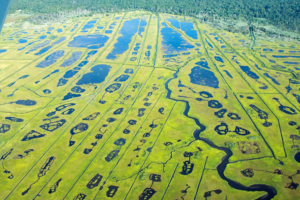
Climate Regulations
In 2020 the DEP began a regulatory reform effort to dramatically cut greenhouse gas (GHG) emissions and adapt to unavoidable climate impacts that are already occurring across the state. These reforms are collectively represented as New Jersey Protecting Against Climate Threats (NJ PACT).
Since establishing this in 2020, New Jersey has adopted various regulations to control and reduce GHG emissions such as:
- Greenhouse Gas Monitoring and Reporting Rule (GHGMR)
- Advanced Clean Truck (ACT) Program and Fleet Reporting Requirements
- Mobile Cargo Handling Equipment at Ports and Intermodal Rail Yards
- Control and Prohibition of Carbon Dioxide Emissions from Stationary Sources
- Model Year 2027 or Later Heavy-Duty New Engine and Vehicle Standards and Requirements, and Diesel Vehicle Inspection Tests and Procedures
From a climate resilience approach, New Jersey has adopted Resilient Environments and Landscapes (REAL), to respond to climate change by considering risks such as sea level rise and chronic flooding, and to facilitate climate resilience by supporting green infrastructure and renewable energy. Through REAL, the Inland Flood Protection rule was adopted in July, 2023.
Programs

Appliance Efficiency Standards
In 2022, the Appliance Standards law was signed which established energy efficiency standards for several categories of residential and commercial appliances.
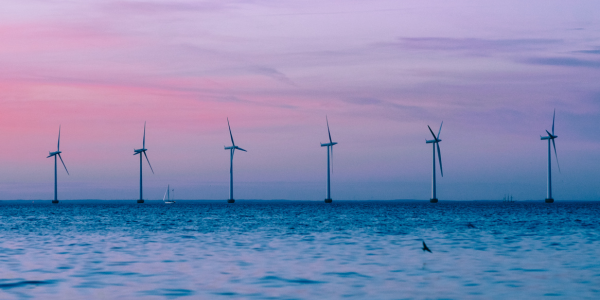
Clean Energy
Discover how New Jersey is advancing its greenhouse gas reduction goals by transitioning to a clean energy future.

Climate Pollution Reduction Grant Program
New Jersey has received $3 million from the U.S. EPA through the Climate Pollution Reduction Grant (CPRG) Program to update and enhance our existing climate action plans.

Drive Green
In New Jersey, transportation is the number one source of greenhouse gas pollution. The state has taken various measures to develop programs that incentivize and lead us towards a fully electrified transportation sector.

Greenhouse Gas Inventory
Greenhouse gas emissions must be reduced in order to tackle climate change. Learn about New Jersey’s emissions profile and how we are taking action to reduce emissions across the state.
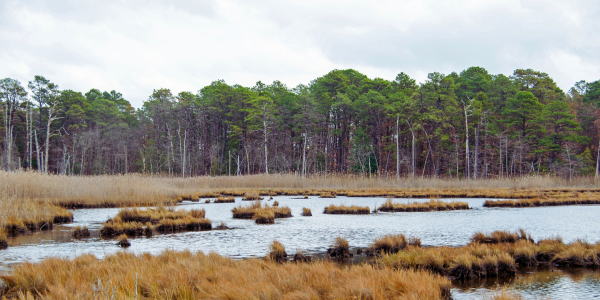
Natural Climate Solutions Grant Program
The Natural Climate Solutions Grant program will fund on-the-ground implementation of projects that create, restore, and enhance New Jersey’s natural carbon sinks utilizing RGGI funds.

Natural and Working Lands Strategy
The Natural and Working Lands Strategy (NWLS) aims to mitigate the effects of climate change through the protection, restoration, and strategic management of New Jersey’s natural and working lands.

NJ PACT
In 2020, New Jersey began a regulatory reform effort which represents New Jersey’s Protection Against Climate Threats (NJ PACT) to help reduce greenhouse gas emissions while making our natural and built environments more resilient to the impacts of climate change that are now unavoidable.

RGGI Program
The Regional Greenhouse Gas Initiative (RGGI) is a partnership between NJDEP, NJEDA, and NJBPU to cap and reduce emissions from the energy sector while investing in programs that further reduce emissions and expand carbon sequestration efforts.
Reports
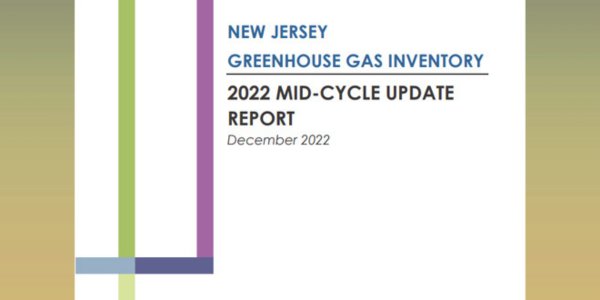
GHG Inventory | 2022 Mid-Cycle Update Report
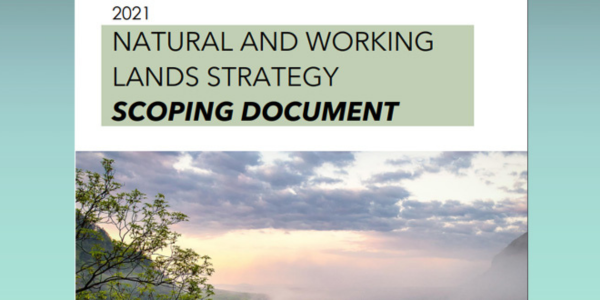
NWLS Scoping Document
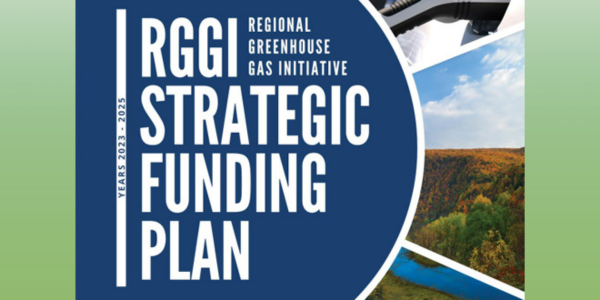
RGGI Strategic Funding Plan
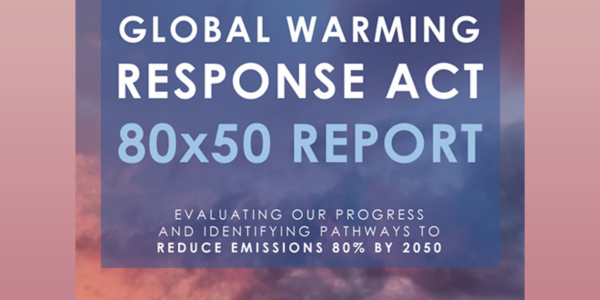
 OFFICIAL SITE OF THE STATE OF NEW JERSEY
OFFICIAL SITE OF THE STATE OF NEW JERSEY